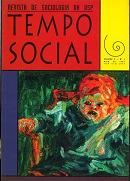Observações sobre a falência dos modelos policiais
DOI:
https://doi.org/10.1590/ts.v9i1.86441Palavras-chave:
Polícia, Organizações, Visões de mundo, Elites.Resumo
O trabalho busca apontar como em diferentes contextos nacionais a polícia se estruturou de formas burocráticas diversas, mas que, ao mesmo tempo, a experiência organizacional produziu agentes policiais com visões de mundo bastante semelhantes. Polícias sob o controle de governos centrais ou locais são ocupadas por pessoal que se expressa da mesma forma. O artigo oferece como hipótese que isso se deve às experiências diárias comuns a todos os sistemas policiais, fazendo da atividade cotidiana o foco da compreensão das práticas policiais. Em seguida, como exemplo, o trabalho busca analisar a prática da polícia carioca no início do século XX, em seus contatos com membros das elites, mostrando como essas práticas produzem, ao mesmo tempo, os limites da autoridade policial e a percepção das áreas onde seu poder pode ser exercido de forma extralegal.
Downloads
Referências
ADIALA, Júlio César. (1996) A criminalização dos entorpecentes. Dissertação (Mestrado). Rio de Janeiro, IUPERJ.
BAYLEY, David H. (1992) Comparative organization of the police in englishspeaking countries. In: TONRY, Michael & MORRIS, Norval. Modern policing. Chicago, University of Chicago Press. p. 509-546.
BESSE, Susan. (1989) Crimes of passion: the campaign against wife killing in Brazil, 1910-1940. Journal of Social History, 22 (4): 653-666, summer.
BRODEUR, Jean Paul. (1992) High policing and low policing: remarks about the policing of political activities. In: MCCORMICK, Kevin R. E. & VISANO, Livy A. Understanding police. Toronto, University of Toronto Press, p. 277-299.
BROGDEN, Mike. (1987) The emergence of the police – the colonial dimension. British Journal of Criminology, 27: 4-14.
CAIN, Maureen. (1992) Trends in the sociology of police work. In: MCCORMICK, Kevin R. E. & VISANO, Livy A. Understanding police. Toronto, University of Toronto Press. p. 3-32.
EMSLEY, Clive. (1993) Mother, what did policemen do when there weren’t any motors? The law and the regulation of motor traffic in England, 1900-1939. The Historical Journal, p. 357-381.
FAUSTO, Bóris. (1984) Crime e cotidiano: a criminalidade em São Paulo (1880-1924). São Paulo, Brasiliense.
MANNING, Peter. (1977) Police work. Cambridge, Mass, Cambridge University Press.
MARTIN, Benjamin. (1984) The hipocrisy of justice in the belle époque. Baton Rouge, Louisiana State University Press.
PALMER, Stanley. (1988) Police and protest in England and Ireland, 1780-1850. Cambridge, Cambridge University Press.
PERNAMBUCO FILHO & BOTELHO, Adauto. (1924) Vícios sociais elegantes. Rio de Janeiro, Livraria Francisco Alves.
REINER, Robert. (1992) Cop culture. In: The politics of the police. 2nd edition. Toronto, The University of Toronto Press. p. 107-137.
ROLPHE, Laurence J. (1983) Police and penal correction in Mexico city, 1876-1911: a study of order and progress in Porfirian Mexico. Tese (Doutorado). Tulane University.
SINDALL, Rob. (1983) Middle-class crime in nineteenth-century England. Criminal Justice History, 4: 23-40.
SKOLNICK, Jerome H. (1966) Justice without trial. Law enforcement in democratic society. New York, MacMillan.
VADACKUMCHERY, James. (1996) Human rights and the police in India. New Delhi, APH Publishers Corporation.
WEINBERGER, Barbara. (1995) The best police in the world. An oral histoty of enghish policing from the 1930's to the 1960's. Aldershot, Scolar Press.
Downloads
Publicado
Edição
Seção
Licença
Copyright (c) 1997 Tempo Social

Este trabalho está licenciado sob uma licença Creative Commons Attribution-NonCommercial 4.0 International License.



